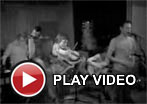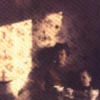 Like many current serious artists, Hajsch—who's work lies somewherebetween experimental electronic, electro-acoustic and musicconcrete—tries to break free from categorization. This remasteredreissue of two limited vinyl only albums originally released in 1992 (Nagual and PFN - Hajsch and collaborators)on his own Quiet Artworks label sound both contemporary andchallenging, thirteen years later. "Akasa" is a quiet but intenseopener: a 16 minute journey starting off with concrete sounds,synthesizers and field recordings which build up an electrifyingatmosphere slowly that finally reaches it's peak when an almostorchestral ensemble of viola, cello and clarinet appears. "Nagual (Part1)" takes use of sharp contrasts, with sparkling water morning birds,bound in a nearly dream-like atmosphere. Parts one and two consistmainly of sounds taken from a bicycle, melodica, and a hardlyrecognizable guitar. In "Nagual (Part 2)" the mood changes to a moreunsettling ambience. For those who've read Carlos Castaneda,this shouldn't be unexpected, as the concept of Nagual stands contraryto Tonal, that represents all our known territory, material andimmaterial. "Nagual (Part 3)" is an otherworldly, nearly harmonic shortappendix created only with synth and samples. "Für Cleo" is a pleasantcinema-like closer where a quiet guitar drone meets a melancholicsaxophone. Hajsch's music requests close attention and throws thelistener in an aural environmentof great clarity. His strength lies with the careful arrangement ofseldom heard sounds in the purposeful use of volume and timing. Thefact that these recordings are over 10 years old doesn't matter much,as 1992is stimulating, serious, and strong evidence that some music can betimeless no matter how styles and technical possibilities change.
Like many current serious artists, Hajsch—who's work lies somewherebetween experimental electronic, electro-acoustic and musicconcrete—tries to break free from categorization. This remasteredreissue of two limited vinyl only albums originally released in 1992 (Nagual and PFN - Hajsch and collaborators)on his own Quiet Artworks label sound both contemporary andchallenging, thirteen years later. "Akasa" is a quiet but intenseopener: a 16 minute journey starting off with concrete sounds,synthesizers and field recordings which build up an electrifyingatmosphere slowly that finally reaches it's peak when an almostorchestral ensemble of viola, cello and clarinet appears. "Nagual (Part1)" takes use of sharp contrasts, with sparkling water morning birds,bound in a nearly dream-like atmosphere. Parts one and two consistmainly of sounds taken from a bicycle, melodica, and a hardlyrecognizable guitar. In "Nagual (Part 2)" the mood changes to a moreunsettling ambience. For those who've read Carlos Castaneda,this shouldn't be unexpected, as the concept of Nagual stands contraryto Tonal, that represents all our known territory, material andimmaterial. "Nagual (Part 3)" is an otherworldly, nearly harmonic shortappendix created only with synth and samples. "Für Cleo" is a pleasantcinema-like closer where a quiet guitar drone meets a melancholicsaxophone. Hajsch's music requests close attention and throws thelistener in an aural environmentof great clarity. His strength lies with the careful arrangement ofseldom heard sounds in the purposeful use of volume and timing. Thefact that these recordings are over 10 years old doesn't matter much,as 1992is stimulating, serious, and strong evidence that some music can betimeless no matter how styles and technical possibilities change.
Look up Music for gazing upwards brought to you by Meat Beat Manifesto & scott crow, +/-, Aurora Borealis, The Veldt, Not Waving & Romance, W.A.T., The Handover, Abul Mogard & Rafael Anton Irisarri, Mulatu Astatke, Paul St. Hilaire & René Löwe, Songs: Ohia, and Shellac. Aurora Borealis image from California by Steve. Get involved: subscribe, review, rate, share with your friends, send images! |



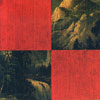 Coming from the school of two guitars, bass and drums, I like to think thatmy interest over the years for certain areas of experimental,electronic-based music has not only lead to a slightly better understandingof the genre but to also recognize and appreciate its more salient artisticqualities. As Antimatter, San Francisco-based sound artist and audioengineer, Xopher Davidson, has recently released a solo disc that plays outlike an aural sojourn to the gallery exhibit of cutting edge abstraction.>From a Powerbook-based standpoint Antimatter vs Antimatter is acollection of experimental soundscapes, frequencies, instrument manipulationand rhythmic collages. Knowing that Davidson holds an MFA could provide someinsight as to his approach when constructing and composing with varioussound textures. Spanning just over an hour, the disc's seventeen tracks areemotionally varied from beautiful and seductive to angry and powerful.Tracks such as "Licht," "Phosphor" and "Gilded Pallor" creatively usetreated/processed guitar as the instrument of focus amidst the intricateweavings of controlled static, low frequencies and drones generated frommodified synthesizers. "Auxiliary" begins with what sounds like an orchestraperforming on an airport tarmac amid the screams of jet engines, all ofwhich abruptly cuts to the odd-timed rhythms of brush-whacked drums againstcycling Euro-styled violin lines that build in intensity over low-endkeyboard drones. "Rangefinder" uses the ultimate droning instrument, thebagpipes, to convey a drawn out melody which is based on layers of specifictones drifting in and out to give the impression of momentum while the lowerfrequencies are subtle and electronically enhanced. A number of the disc'stracks blend together seamlessly as not to interrupt the stream of soundand/or to allow for a musical continuum which results in gradualmodifications until a new composition is occuring. There are certain overallqualities and tones of Antimatter's sound design where, if the mood andsetting are just right, you could get lost in it the same way as when you'restaring at a great painting.
Coming from the school of two guitars, bass and drums, I like to think thatmy interest over the years for certain areas of experimental,electronic-based music has not only lead to a slightly better understandingof the genre but to also recognize and appreciate its more salient artisticqualities. As Antimatter, San Francisco-based sound artist and audioengineer, Xopher Davidson, has recently released a solo disc that plays outlike an aural sojourn to the gallery exhibit of cutting edge abstraction.>From a Powerbook-based standpoint Antimatter vs Antimatter is acollection of experimental soundscapes, frequencies, instrument manipulationand rhythmic collages. Knowing that Davidson holds an MFA could provide someinsight as to his approach when constructing and composing with varioussound textures. Spanning just over an hour, the disc's seventeen tracks areemotionally varied from beautiful and seductive to angry and powerful.Tracks such as "Licht," "Phosphor" and "Gilded Pallor" creatively usetreated/processed guitar as the instrument of focus amidst the intricateweavings of controlled static, low frequencies and drones generated frommodified synthesizers. "Auxiliary" begins with what sounds like an orchestraperforming on an airport tarmac amid the screams of jet engines, all ofwhich abruptly cuts to the odd-timed rhythms of brush-whacked drums againstcycling Euro-styled violin lines that build in intensity over low-endkeyboard drones. "Rangefinder" uses the ultimate droning instrument, thebagpipes, to convey a drawn out melody which is based on layers of specifictones drifting in and out to give the impression of momentum while the lowerfrequencies are subtle and electronically enhanced. A number of the disc'stracks blend together seamlessly as not to interrupt the stream of soundand/or to allow for a musical continuum which results in gradualmodifications until a new composition is occuring. There are certain overallqualities and tones of Antimatter's sound design where, if the mood andsetting are just right, you could get lost in it the same way as when you'restaring at a great painting. 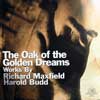 The truth regarding the history of minimalism and American experimentalmusic from the 60s is, despite the best efforts of certainmusicologists and writers, becoming much more widely know. As it does,more and more labels get in on the game of releasing the archivalrecordings that document the history better that any text can. Thesetwo CDs are part of this revisionism. Maxfield was older than most ofthe 60s pioneers; he had his grounding in the academy, ambitions ofbeing a composer of serious music, and access to the space and musicianresources of the classical world. He was pretty much ready to roll whenCage hit the scene. But his music, as presented here in these fourworks from 1960 to 63, is immediate, effective and without the need oftheoretical crutches. Each of these pieces can be seen as inventiveAmerican responses to develoments in the European avant-garde: Pastoral Symphonyto 18's electronic music but with the major difference of having beencontinuously synthesized (on which synth I wonder?) rather than splicedtogether; Bacchanale to Schaeffer's and Henry's musique concrète here incorporating beat poetry, jazz and narrative; Piano Concert for David Tudor, combining tape music with live piano, to Stockhausen's Kontakte (1960 version) with similarly unexpected and dramatic results; and finally Amazing Grace,based as it is on repetitive tape loops, being the most intrinsicallyAmerican of all. Maxfield's valuable and underrated work was ended in1969 when he died, a casualty of 60s drug culture. Harold Budd's musicis much less to my taste. I never put much effort into exploring hismusic since none of it ever caught my fancy but Budd's place in theworld of ambient and spiritualized meditative music is obviously one ofintegrity. The Oak of the Golden Dreams catches Buddimprovising bagpipe music on the Buchla synth in 1970, a twiddley modalchanter line over a continuous E flat drone (but it's probably relevantthat I grew up in Scotland to hate bagpipes). Coeur D'Orr hasessentially the same structure: two organ chords, D flat major on theright channel and B major on the left, sit there shimmering andswelling while Charles Oreña noodles a highly expressionist and attimes decidedly jazzy (Coltrane rather than Paul Desmond) line on thesoprano sax. Initially (the sax only comes in in the third minute) theresemblance to Charlemagne Palestine's organ music is obvious. But herethe organ is static and not central, functioning as a bed for melodicimprovisation within the static harmonic sound shape. Thecorrespondence to, say, Frank Zappa's guitar noodling within staticstructures, e.g. 'Ship Ahoy', is more accurate. Such overtly happy(hippy?) music isn't my bag but if you dig Budd these are surely twoimportant documents.
The truth regarding the history of minimalism and American experimentalmusic from the 60s is, despite the best efforts of certainmusicologists and writers, becoming much more widely know. As it does,more and more labels get in on the game of releasing the archivalrecordings that document the history better that any text can. Thesetwo CDs are part of this revisionism. Maxfield was older than most ofthe 60s pioneers; he had his grounding in the academy, ambitions ofbeing a composer of serious music, and access to the space and musicianresources of the classical world. He was pretty much ready to roll whenCage hit the scene. But his music, as presented here in these fourworks from 1960 to 63, is immediate, effective and without the need oftheoretical crutches. Each of these pieces can be seen as inventiveAmerican responses to develoments in the European avant-garde: Pastoral Symphonyto 18's electronic music but with the major difference of having beencontinuously synthesized (on which synth I wonder?) rather than splicedtogether; Bacchanale to Schaeffer's and Henry's musique concrète here incorporating beat poetry, jazz and narrative; Piano Concert for David Tudor, combining tape music with live piano, to Stockhausen's Kontakte (1960 version) with similarly unexpected and dramatic results; and finally Amazing Grace,based as it is on repetitive tape loops, being the most intrinsicallyAmerican of all. Maxfield's valuable and underrated work was ended in1969 when he died, a casualty of 60s drug culture. Harold Budd's musicis much less to my taste. I never put much effort into exploring hismusic since none of it ever caught my fancy but Budd's place in theworld of ambient and spiritualized meditative music is obviously one ofintegrity. The Oak of the Golden Dreams catches Buddimprovising bagpipe music on the Buchla synth in 1970, a twiddley modalchanter line over a continuous E flat drone (but it's probably relevantthat I grew up in Scotland to hate bagpipes). Coeur D'Orr hasessentially the same structure: two organ chords, D flat major on theright channel and B major on the left, sit there shimmering andswelling while Charles Oreña noodles a highly expressionist and attimes decidedly jazzy (Coltrane rather than Paul Desmond) line on thesoprano sax. Initially (the sax only comes in in the third minute) theresemblance to Charlemagne Palestine's organ music is obvious. But herethe organ is static and not central, functioning as a bed for melodicimprovisation within the static harmonic sound shape. Thecorrespondence to, say, Frank Zappa's guitar noodling within staticstructures, e.g. 'Ship Ahoy', is more accurate. Such overtly happy(hippy?) music isn't my bag but if you dig Budd these are surely twoimportant documents.  Andso to the Palestine CD which presents five slices of his electronicdrone music recorded between 1967 and 1970. Palestine's innatepredilection for evolving static sounds, transcendental drones andspiritual elevation was evident well before he first had access to thesynthesizers that allowed real-time manipulation of additive (combiningdifferent tones) and subtractive (filtering) synthesis. Thepossibilities for improvised drone music were obvious and he eventuallyhad a custom machine built for this purpose with 16 ultra-stableoscillators from Serge Tcherepnin and 4 band pass filters from DonaldBuchla. The five pieces here, all subtitled Late Night Electronic Sonority,are snapshots from his "spectral continuum searches for the goldensonority—day, week, month long journeys of harmonies and theirovertones in constant evolution in time and transformation in space."The music is heavy with tension, balanced somewhere between fear,existential question and the possibility of hope; glistening,shimmering and perfectly judged. It's a remarkable achievement thatPalestine originated this approach to music, the instrument design andits musical practice, performed these masterful improvisations,inspired a whole generation of musicians and wound up as a merefootnote, if that, in the history of minimalism. Take those PhillipGlass and John Adams disks down to the thrift store and get abordminimalism's revisionist revolution; apart from being more authentic,the real stuff is of infinitely superior taste and actually has a soul.
Andso to the Palestine CD which presents five slices of his electronicdrone music recorded between 1967 and 1970. Palestine's innatepredilection for evolving static sounds, transcendental drones andspiritual elevation was evident well before he first had access to thesynthesizers that allowed real-time manipulation of additive (combiningdifferent tones) and subtractive (filtering) synthesis. Thepossibilities for improvised drone music were obvious and he eventuallyhad a custom machine built for this purpose with 16 ultra-stableoscillators from Serge Tcherepnin and 4 band pass filters from DonaldBuchla. The five pieces here, all subtitled Late Night Electronic Sonority,are snapshots from his "spectral continuum searches for the goldensonority—day, week, month long journeys of harmonies and theirovertones in constant evolution in time and transformation in space."The music is heavy with tension, balanced somewhere between fear,existential question and the possibility of hope; glistening,shimmering and perfectly judged. It's a remarkable achievement thatPalestine originated this approach to music, the instrument design andits musical practice, performed these masterful improvisations,inspired a whole generation of musicians and wound up as a merefootnote, if that, in the history of minimalism. Take those PhillipGlass and John Adams disks down to the thrift store and get abordminimalism's revisionist revolution; apart from being more authentic,the real stuff is of infinitely superior taste and actually has a soul.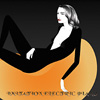 Following up an EP released a couple years back, Stereolab bassistSimon Johns has assembled the first full-length from his project. Theband consists of fantastic players, utilizing a wide spectrum ofinstruments and honing a driving sound most Stereolab fans could easilylatch on to. However, as I enjoyed the brevity of the other EP, as anLP, there's simply something missing. While the music is pleasant andenjoyable, most of the songs don't really progress far from their entrypoint. In addition, with the lack of melodic variety and the frequentdroning of single note playing, all the tracks makes this ensemblesound almost too "jam-band-y" for my own personal tastes. For the mostpart, it never quite gets offensive, that is until the "Theme for anImitation Electric Piano," with the atrocious "Rockin' and rollin' /the theme for an imitation electric piano" lyrics. Getting through theentire album just isn't as rewarding as a short 5-track EP of stuffthat gets in late and gets out early. If the eponymous EP gave thefeeling of a tap, slap, and run, Trinity Neon is a wait, get impatient and give up kinda feel, which, at best can serve as decent aural wallpaper.
Following up an EP released a couple years back, Stereolab bassistSimon Johns has assembled the first full-length from his project. Theband consists of fantastic players, utilizing a wide spectrum ofinstruments and honing a driving sound most Stereolab fans could easilylatch on to. However, as I enjoyed the brevity of the other EP, as anLP, there's simply something missing. While the music is pleasant andenjoyable, most of the songs don't really progress far from their entrypoint. In addition, with the lack of melodic variety and the frequentdroning of single note playing, all the tracks makes this ensemblesound almost too "jam-band-y" for my own personal tastes. For the mostpart, it never quite gets offensive, that is until the "Theme for anImitation Electric Piano," with the atrocious "Rockin' and rollin' /the theme for an imitation electric piano" lyrics. Getting through theentire album just isn't as rewarding as a short 5-track EP of stuffthat gets in late and gets out early. If the eponymous EP gave thefeeling of a tap, slap, and run, Trinity Neon is a wait, get impatient and give up kinda feel, which, at best can serve as decent aural wallpaper.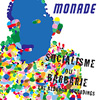 The first exposure to the lead singer of Stereolab, Laetitia Sadier's solo project Monade came on a split single with M (later known as Aerial M and currently Papa M). The music was unobtrusive, peaceful, and serene, much unlike the intense sounds Stereolab were notorious for. Finding Monade music was always a treat, whether it was on an obscure 7" single or a split release.
The first exposure to the lead singer of Stereolab, Laetitia Sadier's solo project Monade came on a split single with M (later known as Aerial M and currently Papa M). The music was unobtrusive, peaceful, and serene, much unlike the intense sounds Stereolab were notorious for. Finding Monade music was always a treat, whether it was on an obscure 7" single or a split release. Touted by just about every publication as being one of the next bestthings, The Stratford 4 leave a lot to be desired on this, their secondfull-length. Equally influenced it seems by My Bloody Valentine, TheCure, and scores of Brit-pop bands, their music is delayed anddistorted guitars with a pop sensibility. Officially, I would like tosay that this sound is going to take them absolutely nowhere unlessthey can improve the juvenile lyric-writing. The music is just fine,imploring pleasant melodies, grooving basslines, and lots of effectsthat make the guitars swirl and shriek behind them. Unfortunately, whatcomes to the forefront is just plain awful. "I went to confession but Ihad nothing to confess. They said what's wrong with you? You're usuallysuch a mess" is almost as bad as "If you want to kiss my mouth, tell mewhat it's all about, if you want to climb into bed with your delicatehead than that would be alright." This is a study in how to write likeDamon Albarn, with a great sense at times of what good music is, but nograsp whatsoever of poetry or prose. This music could stand a bit ofvariation, too, as it seems every song says what it's supposed to inthe first three minutes, then jams out a bit for the rest; or it jams abit in the beginning to build to the proper idea, then soars outtowards the end. The first song on the album, "Where the Ocean Meetsthe Eye," is the only one that shows promise in this sound, with quietbass joining chiming delayed guitars and slightly echoed drums. It allgets engulfed as the flames of loud angry distortion grow higher andhigher. The vocals join in at the height of the volume, and the lyricsare wailed in such a way that they aren't always recognizable. Perfect.Let the music talk and let the lyrics be puzzled over. If they'd donethat more, it probably wouldn't be so bad.
Touted by just about every publication as being one of the next bestthings, The Stratford 4 leave a lot to be desired on this, their secondfull-length. Equally influenced it seems by My Bloody Valentine, TheCure, and scores of Brit-pop bands, their music is delayed anddistorted guitars with a pop sensibility. Officially, I would like tosay that this sound is going to take them absolutely nowhere unlessthey can improve the juvenile lyric-writing. The music is just fine,imploring pleasant melodies, grooving basslines, and lots of effectsthat make the guitars swirl and shriek behind them. Unfortunately, whatcomes to the forefront is just plain awful. "I went to confession but Ihad nothing to confess. They said what's wrong with you? You're usuallysuch a mess" is almost as bad as "If you want to kiss my mouth, tell mewhat it's all about, if you want to climb into bed with your delicatehead than that would be alright." This is a study in how to write likeDamon Albarn, with a great sense at times of what good music is, but nograsp whatsoever of poetry or prose. This music could stand a bit ofvariation, too, as it seems every song says what it's supposed to inthe first three minutes, then jams out a bit for the rest; or it jams abit in the beginning to build to the proper idea, then soars outtowards the end. The first song on the album, "Where the Ocean Meetsthe Eye," is the only one that shows promise in this sound, with quietbass joining chiming delayed guitars and slightly echoed drums. It allgets engulfed as the flames of loud angry distortion grow higher andhigher. The vocals join in at the height of the volume, and the lyricsare wailed in such a way that they aren't always recognizable. Perfect.Let the music talk and let the lyrics be puzzled over. If they'd donethat more, it probably wouldn't be so bad.  First issued in 2001 in a limited, card-packaged edition on the DutchBrombron label (a guise of Staalplaat, in collaboration with theNijmegen rehearsal space Extrapool), Heroin (reviewed in
First issued in 2001 in a limited, card-packaged edition on the DutchBrombron label (a guise of Staalplaat, in collaboration with theNijmegen rehearsal space Extrapool), Heroin (reviewed in  The alternative country sound seems to get no respect anymore, as itnever really achieved any of the goals it was going for. There arepublications dedicated to it, sure, and records come out all the timefor its stalwarts like Ryan Adams and the Jayhawks; but alt-country, asit is often called, never revolutionized country music, and its artistsare still not widely recognized by mainstream country. With theexception of bands like Nickel Creek doing a Stephen Malkmus song ontheir last album or Johnny Cash doing Soundgarden or Nine Inch Nails,it also seems to have lost some of its alternative edge. That's allabout to change with the arrival of Kathleen Edwards. For me, thepinnacle of the alt-country sound was Whiskeytown, the band Ryan Adamshad with Caitlin Cary until 2000. They had it all: beautiful harmonies,great hooks, and songs about booze and heartache. Edwards continuestheir sound on the first song on Failer,then promptly blows it the hell away. She even plays violin, like Carydid in Whiskeytown, adding a sadness or playfulness to certain songs,just to get the right feeling in the right place. Her sound is at onceclassic and new, her voice is assured and insecure, the songs perfectand uneven. She's also quite aware of the difficulties of selling hersound, as she states nicely in "One More Song the Radio Won't Like,"and on songs like "Six O'Clock News" and "Hockey Skates" you wonder whythe mainstream press won't just eat it up at the same time that youhope they won't. Even though there seems to be a preoccupation withbooze and bars in her music, they're not bad things for a country starto be singing about, though it seems there are more weaknesses Edwardscould be exploring. She hints at big ones in small mentions, aboutbabies coming in June, and how she can't seem to do anything right.Every time it comes right back to tipping a glass/bottle or, on onesong at least, getting high. Mostly, though, the whole album has a feelabout getting out. Maybe Edwards will break out with this record, but Ihope she doesn't lose sight of this desperation and sadness. It's worthmuch more even it means no one will hear it.
The alternative country sound seems to get no respect anymore, as itnever really achieved any of the goals it was going for. There arepublications dedicated to it, sure, and records come out all the timefor its stalwarts like Ryan Adams and the Jayhawks; but alt-country, asit is often called, never revolutionized country music, and its artistsare still not widely recognized by mainstream country. With theexception of bands like Nickel Creek doing a Stephen Malkmus song ontheir last album or Johnny Cash doing Soundgarden or Nine Inch Nails,it also seems to have lost some of its alternative edge. That's allabout to change with the arrival of Kathleen Edwards. For me, thepinnacle of the alt-country sound was Whiskeytown, the band Ryan Adamshad with Caitlin Cary until 2000. They had it all: beautiful harmonies,great hooks, and songs about booze and heartache. Edwards continuestheir sound on the first song on Failer,then promptly blows it the hell away. She even plays violin, like Carydid in Whiskeytown, adding a sadness or playfulness to certain songs,just to get the right feeling in the right place. Her sound is at onceclassic and new, her voice is assured and insecure, the songs perfectand uneven. She's also quite aware of the difficulties of selling hersound, as she states nicely in "One More Song the Radio Won't Like,"and on songs like "Six O'Clock News" and "Hockey Skates" you wonder whythe mainstream press won't just eat it up at the same time that youhope they won't. Even though there seems to be a preoccupation withbooze and bars in her music, they're not bad things for a country starto be singing about, though it seems there are more weaknesses Edwardscould be exploring. She hints at big ones in small mentions, aboutbabies coming in June, and how she can't seem to do anything right.Every time it comes right back to tipping a glass/bottle or, on onesong at least, getting high. Mostly, though, the whole album has a feelabout getting out. Maybe Edwards will break out with this record, but Ihope she doesn't lose sight of this desperation and sadness. It's worthmuch more even it means no one will hear it.